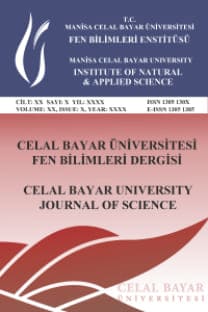CO-CULTURE YÖNTEMİ İLE PULLULAN ELDESİ - PULLULAN PRODUCTION BY CO-CULTURE METHOD
CO-CULTURE YÖNTEMİ İLE PULLULAN ELDESİPullulan, kimyasal yapı olarak başlıca α-1,6 glikozidik bağlarıyla bağlanmış maltotrioz ünitelerinden oluşan bir glukandır. Endüstriyel açıdan öneme sahip olan bu homopolisakkarit, polimorfik bir küf olan Aureobasidium pullulans tarafından hücre dışı olarak üretilmektedir. Pullulan biyopolimeri, biyolojik olarak parçalanabilen, yağa dirençli, sıcaklıktan etkilenmeyen, oksijen geçirmeyen, toksik olmayan yapı özellikleri göstermektedir ve suda çözünebilmektedir. Pullulan, bu özelliklerinin sonucunda yenilebilen filmlerin üretiminde kullanılmak için oldukça uygun bir polisakkarittir. Pullulan yenilebilen filmlerin üretiminin yanı sıra gıda, ilaç ve kozmetik gibi birçok alanda da kullanılabilmektedir. Bu çalışmada Aureobasidium pullulans ve Kluyveromyces marxianus suşlarından pullulan üretimi ve karakterizasyonu gerçekleştirilmiştir. Bu amaçla suşların besiyerinde üremeleri ve pullulan üretme yetenekleri ve aktivite gösterdiği optimum sıcaklık, pH, inokulum zamanları saptanmıştır. Pullulan üretimi için fermentasyon şartları optimize edilmiştir. Optimum fermentasyon şartları üretim süresi 3 gün, substrat konsantrasyonu 5 %, pH 7.5 ve üretim sıcaklığı 28°C olarak saptanmştır.PULLULAN PRODUCTION BY CO-CULTURE METHODPullulan is a -glucan consisting mainly of maltotriose units interconnected via – 1,6 linkages. Pullulan is an extracellular polysaccharide produced by the polymorphic fungus Aureobasidium pullulans.It can be extruded easily as films that are biodegradable, is resistant to oils and grease, unaffected by temperature, impermeable to oxygen, nontoxic and therefore edible. Pullulan is a suitable polysaccharide due to its good-film-forming properties for production of edible protective films. Besides its applications in the edible film industry, pullulan has numerous applications in food, cosmetics and pharmacological industries. In this study, pullulan from Aureobasidium pullulans and Kluyveromyces marxianus strains was produced and characterized. The effect of initial pH, fermentation time, incubation temparature and initial substrate concentration was investigated. The highest pullulan concentration of 17.32 g/L was obtained for afermentation of period of 72 h with the initial substrate concentration equivalent to 50 g/L and incubation temperature at 28°C, pH 7.5
Anahtar Kelimeler:
Mikrobiyal polisakkarit, pullulan, Aureobasidium pullulans, Kluyveromyces marxianus, yenilebilir film
Co-Culture Yöntemi İle Pullulan Eldesi
Pullulan is a -glucan consisting mainly of maltotriose units interconnected via – 1,6 linkages. Pullulan is an extracellular polysaccharide produced by the polymorphic fungus Aureobasidium pullulans.It can be extruded easily as films that are biodegradable, is resistant to oils and grease, unaffected by temperature, impermeable to oxygen, nontoxic and therefore edible. Pullulan is a suitable polysaccharide due to its good-film-forming properties for production of edible protective films. Besides its applications in the edible film industry, pullulan has numerous applications in food, cosmetics and pharmacological industries. In this study, pullulan from Aureobasidium pullulans and Kluyveromyces marxianus strains was produced and characterized. The effect of initial pH, fermentation time, incubation temparature and initial substrate concentration was investigated. The highest pullulan concentration of 17.32 g/L was obtained for afermentation of period of 72 h with the initial substrate concentration equivalent to 50 g/L and incubation temperature at 28°C, pH 7.5
Keywords:
Microbial polysaccharides, pullulan, Aureobasidium pullulans, Kluyveromyces marxianus, edible films,
___
- [1] Seviour, R. J., Stasinopoulos, S. J., Auer, D. P. F. and Gibbs, P. A., 1992. Production of pullulan and other exopolysaccharides by filamentous fungi. Critical Reviews in Biotechnology, 12 (3): 279-329.
- [2] Auer, D. P. F., and Seviour, R. J., 1990. Influence of varying nitrogen sources on polysaccharide production by Aureobasidium pullulans in batch culture. Applied Microbiology and Biotecnology, 32: 637-644.
- [3] Chi, Z. And Zhao, S., 2003. Optimization of medium and cultivation conditions for pullulan production by a new pullulan producing yeast. Enzyme and Microbial Biotecnology, 33: 206- 211.,
- [4] Dağbağlı S., Güvenç U., Göksungur Y., 2008. Mikrobiyal bir polisakkarit: pullulan. Akademik Gıda, 6(3): 42-48.
- [5] Chul Shin, Y., Kim, Y. H., Lee, H. S., Cho, S. J. and Byun, S. M., 1989. Production of exopolysaccharide pullulan from inulin by a mixed culture of Aureobasidium pullulans and Kluyveromyces fragilis. Biotechnology and Bioengineering, 33: 129-133.
- [6] Lacroix, C., LeDuy, A., Noel, G. and Choplin, L., 1985. Effect of pH on the batch fermentation of pullulan from sucrose medium. Biotechnology and Bioengineerin, 27: 202-207.
- [7] Israilides, C., Scanlon, B. Smith, A., Harding, S. E. and Jumel, K., 1994. Characterization of pullulans produced from agro-industrial wastes. Carbohydrate Polymers, 25: 203-209.
- [8] Israilides, C., Smith, A., Harthill, J. E., Barnett, C., Bambalov, G., Scanlon, B., 1998.. Pullulan content of the ethanol precipitate from fermented agro-industrial wastes. Applied Microbiology and Biotechnology, 49: 613-617.
- [9] Youssef, F., Roukas, T. and Biliaderis, C. G., 1999. Pullulan production by a non-pigmented strain of Aureobasidium pullulans using batch and fed-batch culture. Process Biochemistry, 34: 355- 366.
- [10] Göksungur Y., Uçan A. & Güvenç U., 2004. Production of pullulan from beet molasses and synthetic medium by Aureobasidium pullulans. Turkish Journal of Biology, 28: 23-30.
- ISSN: 1305-130X
- Başlangıç: 2005
- Yayıncı: Manisa Celal Bayar Üniversitesi Fen Bilimleri Enstitüsü
